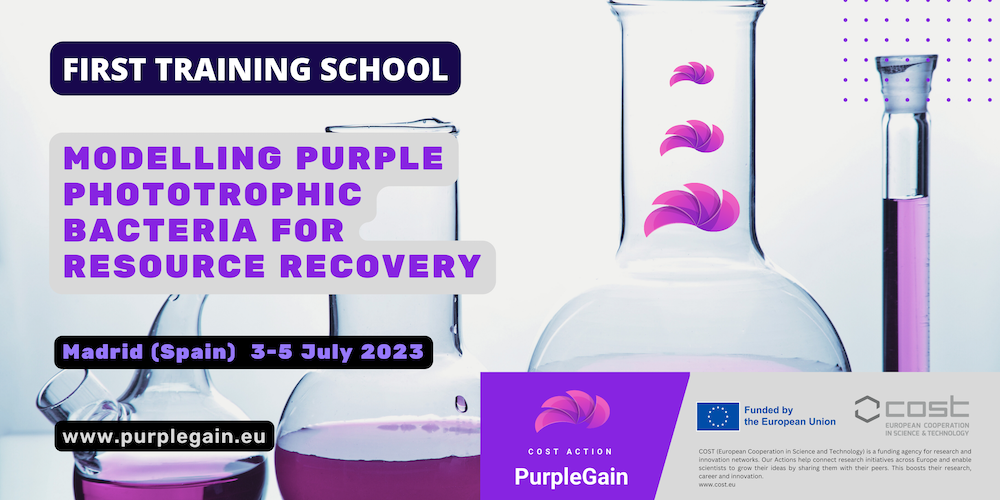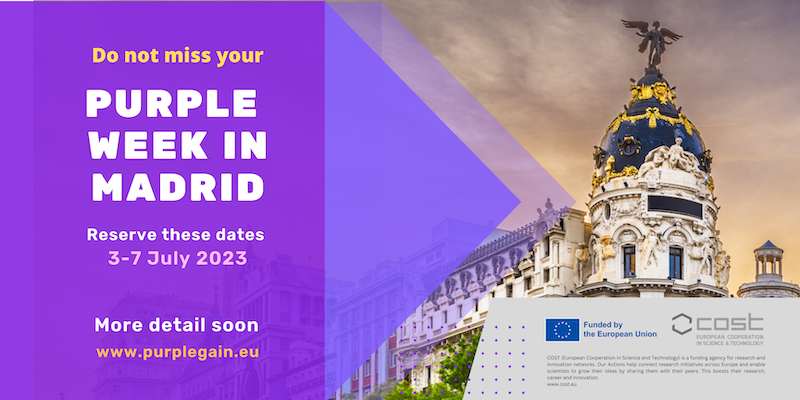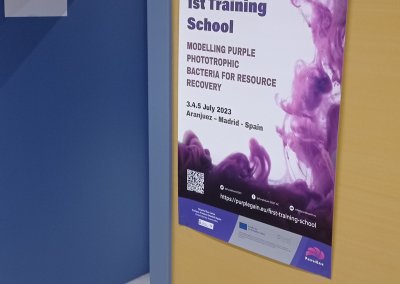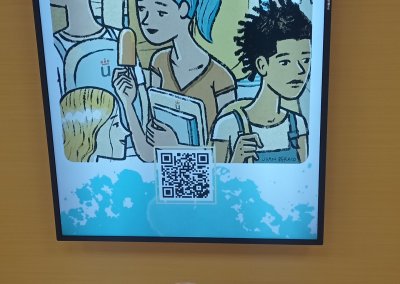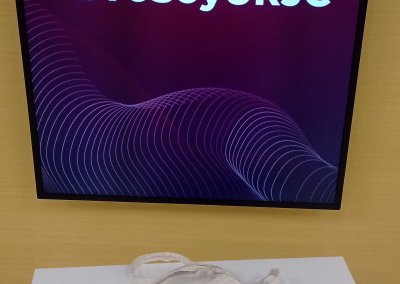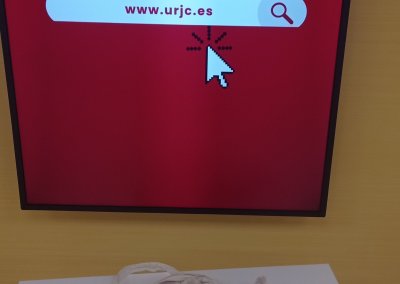First Training School
Modelling Purple Phototrophic Bacteria
for Resource Recovery
3-5 July 2023
Aranjuez, Madrid – Spain
First Training School
Modelling Purple Phototrophic Bacteria
for Resource Recovery
3-5 July 2023
Aranjuez, Madrid – Spain
First Training School – Modelling Purple Phototrophic Bacteria for Resource Recovery
Presentation
Modeling biological processes is a critical practice in many biotechnological applications. Among them, photosynthetic processes are increasingly gaining attention from the environmental engineering community. The use of purple phototrophic bacteria for solving environmental biotechnology problems is an emerging field of knowledge inspired by classical biotechnological methods like activated sludge or microalgae processes. Still, it is intrinsically complex due to the high metabolic versatility of purple phototrophic bacteria and its relationship with light. Therefore, developing valuable and universal models that can help control and simulate purple phototrophic bacteria-based process is challenging and suppose a trend of knowledge still under development by the scientific community. The main challenge is to simultaneously address biochemistry, mass balance, metabolism, and biophysics, which is unique in classical biological models in environmental engineering.
This Training School focuses on learning the theoretical basis and practical applications of kinetic modeling of biotechnological processes using purple photosynthetic bacteria. The Training School addresses the problem from a triple perspective, involving biochemistry (kinetics and thermodynamics), metabolism (genomics), and biophysics (photon-electron interaction). Experts will impart the three-day summer school from a diverse portfolio of disciplines from all over Europe, under the frame of the Cost Action CA21146 – Fundamentals and applications of purple bacteria biotechnology for resource recovery from waste (PURPLEGAIN).
- Celebration dates: 3-5 July 2023, Aranjuez (Madrid), Spain
- Location: The First Training School will be celebrated at the Hospital San Carlos of Campus Aranjuez (Madrid) of the University Rey Juan Carlos.
- Course Website: First Training School – Modelling Purple Phototrophic Bacteria for Resource Recovery
The Training School is held under the “Purple Week in Madrid” (3-7 July 2023), which includes this Summer School (3-5 July), a Workshop (6th of July), and a Meeting of the Management Committee of the Cost Action (7th of July). The Summer School is entirely given in English, and registration is free.
To participate in this activity, there are two procedures:
- Participants who wish to receive financial aid: the form to apply for financial aid to attend the Summer School is now available at https://purplegain.eu/first-training-school/. Applications should be submitted before 8th June.
- Apart from submitting a form to apply for funding, registration on the official URJC website https://eventos.urjc.es/97944/tickets.html is compulsory.
- General registration without financial aid: Please register at https://eventos.urjc.es/97944/tickets.html.
Location
Schedule
3rd July 2023 | Biochemical modeling
Time | Title | Trainer |
| 8:45–9:00 | Presentation of the Training School | Dr. Daniel Puyol. Director of the Summer School. Chair of the COST Action PurpleGain. Senior Researcher in the Group of Chemical and Environmental Engineering, Universidad Rey Juan Carlos, Spain |
| 9:00–10:10 | Introduction to modeling of purple phototrophic bacteria. | Dr. Daniel Puyol |
| 10:10–10:30 | Coffee Break | |
| 10:30–11:40 | Biochemical modeling | Dr. Gabriel Capson-Tojo. INRAE, France |
| 11:40–12:50 | Thermodynamics of purple phototrophic bacteria. | Prof. Ralph Lindeboom. Technical University of Delft, Netherlands. |
| 12:50–14:00 | Lunch Break | |
| 14:00–16:00 | Computer practicum | Dr. Ioanna Vasiliadou, Assistant Professor in the University of Western Macedonia, Greece |
| 15:50 – 16:10 | Break | |
| 16:00–18:00 | Computer practicum | Dr. Gabriel Capson-Tojo. INRAE, France Prof. Raúl Molina, Associated Professor in the Department of Chemical and Environmental Technology, Universidad Rey Juan Carlos, Spain. |
4rd July 2023 | Metabolic modeling
Time | Title | Trainer |
| 9:00 – 10:10 | Introduction to the metabolism of purple phototrophic bacteria. | Prof. David Weissbrodt. Department of Biotechnology and Food Science. Faculty of Natural Sciences. Norwegian University of Science and Technology, Norway. |
| 10:10 – 10:30 | Coffee Break | |
| 10:30 – 11:40 | Metabolic modeling in purple phototrophic bacteria. | Prof. Damien Batstone. Director of the Australian Centre for Water and Environmental Biotechnology, University of Queensland, Brisbane, Australia |
| 11:40 – 12:50 | Genome-scale metabolic models. | Dr. Sergio Bordel. Senior Researcher in the Institute of Sustainable Processes. Universidad de Valladolid, Spain |
| 12:50 – 14:00 | Lunch Break | |
| 14:00 – 15:50 | Computer practicum | Dr. Sergio Bordel. Senior Researcher in the Institute of Sustainable Processes. Universidad de Valladolid, Spain Prof. Damien Batstone. Director of the Australian Centre for Water and Environmental Biotechnology, University of Queensland, Brisbane, Australia |
| 15:50 – 16:10 | Break | |
| 16:10 – 18:00 | Computer practicum | Dr. Sergio Bordel. Senior Researcher in the Institute of Sustainable Processes. Universidad de Valladolid, Spain Prof. Damien Batstone. Director of the Australian Centre for Water and Environmental Biotechnology, University of Queensland, Brisbane, Australia |
5th July 2023 | Biophysical modeling
Time | Title | Trainer |
| 9:00 – 10:10 | The structure and function of photosynthetic membrane in purple phototrophic bacteria. | Dr. Alastair T. Gardiner, Institute of Microbiology, Centre Algatech, Czech Republic |
| 10:10 – 10:30 | Coffee Break | |
| 10:30 – 11:40 | Basic concepts about the biophysics of photosynthetic microorganisms. | Prof. Michal Koblížek. Head of the Laboratory of Anoxygenic Phototrophs, Institute of Microbiology CAS, Trebon, Czech Republic.
|
| 11:40 – 12:50 | Modeling photon-electron interaction and charge transfer in purple photosynthetic bacteria. | Prof. Spyridon Skourtis. Professor of Biophysics in the Department of Physics, University of Cyprus, Cyprus.
|
| 12:50 – 15:00 | Lunch Break | |
| 15:00 – 16:20 | Computer practicum | Prof. Michal Koblížek. Head of the Laboratory of Anoxygenic Phototrophs, Institute of Microbiology CAS, Trebon, Czech Republic. |
| 16:20 – 16:40 | Break | |
| 16:40 – 18:00 | Computer practicum | Prof. Spyridon Skourtis. Professor of Biophysics in the Department of Physics, University of Cyprus, Cyprus. |
| 18:00 – 18:30 | Conclusions, Remarks and Closing | Dr. Daniel Puyol |
Financial Support – Application procedure for reimbursement
Documentation for applying
The documentation needed for applying for reimbursement are as follows:
- Applicants must upload a short Curriculum Vitae (in English).
- Applicants must upload a motivation letter (in English).
- Applicants must upload a scanned copy of their passport (if applicants do not have a passport, they can upload their national ID card)
Selection criteria
The selection criteria for participants that will be eligible for reimbursement will comply with the COST Excellence and Inclusiveness Policy, in the implementation of the Action and will encourage attendance by a diverse selection of participants in consideration of:
- Underrepresented groups, including those with disabilities. Priority will be given to underrepresented groups, including those with disabilities.
- Gender balance.
- The level of involvement of Inclusiveness Target Countries (ITCs). Priority will be given to participants from Inclusiveness Target Countries. The current list of ITCs include: Albania, Armenia, Bosnia and Herzegovina, Bulgaria, Cyprus, Czech Republic, Estonia, Croatia, Georgia, Greece, Hungary, Lithuania, Latvia, Malta, Moldova, Montenegro, Poland, Portugal, Romania, Slovenia, Slovakia, Republic of North Macedonia, Republic of Serbia, Turkey and Ukraine.
- The level of involvement of Early Career Investigators (ECIs). Priority will be given to PhD students and young post-doctoral researchers, followed by senior post-doctoral researchers and professors.
- In addition, workshop organizers may also consider other special attributes such as
- Type, or level of expertise in the field of the Training summer school based on the curiculum vitae
- Appropriate core knowledge and understanding
- Willingness to participate based on the motivation letter
- Demonstrated interest based on the motivation letter
- The positive impact that the participation will have on the applicant’s future carrier
Financial contribution
Financial support through reimbursement does not necessarily cover all expenses but is a contribution to the overall travel, accommodation and meal expenses. The financial contribution includes a Daily Allowance fee (DA) and travel expenses. The DA is a fixed amount of EUR 90 per day, totalizing EUR 360 per successful applicant.
The travel expenses for each successful applicant shall respect the following criteria:
Up to a maximum of EUR 400 in total can be afforded to each successful applicant from ITC country.
Up to a maximum of EUR 250 in total can be afforded to each successful applicant from non-ITC country.
Up to a maximum of EUR 150 in total can be afforded to each successful applicant from Spain.
This financial contribution must be understood as a financial aid aimed to help applicants to cover the expenses of their participation in the Training summer school. This financial aid does not aim to cover 100% of the expenses.
Please see the General Rules to be reimbursed.
Evaluation process and result announcement
Evaluation process
The selection committee, composed of the Action Chair, the Vice Chair, the Grant Awarding coordinator, the Training Schools Coordinator and the WG1 Leader, will evaluate the applications within an 18-days period (after the abstract submission deadline) and will inform all the applicants for their evaluation results. The successful applicants will then receive an e-mail from the grant holder (Grant Letter Notification), stating the official approval of the reimbursement, the granted budget and a payment request form which has to be completed after the completion of the Training summer school.
Criteria of reimbursement
If the amount of reimbursement by all applications within a call does not exceed the available budget, the applications are handled by the selection committee. If there are more applications than funding is available, the following procedure takes place.
- A list of all applications (containing an informative summary) is distributed to all members of the selection committee in form of a table in which every evaluator can mark which applications he or she can evaluate according to their field of expertise.
- To guarantee a fair and objective evaluation, an evaluator should have no affiliation with neither the home nor the host institution of the application in question.
- All applications are evaluated by two members of the selection committee. The Grant Awarding coordinator distributes the proposals to the individual evaluators.
- The criteria given in the table below shall be applied for evaluation. The first criterion (a) is assessed by the Grant Awarding coordinator prior to the evaluation process.
| Criterion | max. points |
| a) Before any further criteria are considered | |
| Application is complete and fulfils all formal requirements | pass/no pass |
| The application will be ranked last if the applicant was granted in previous call | pass/no pass |
| b) Evaluation of the application | |
| Applicant from ITC country | 0 or 10 |
| Applicant is ECI (or promotes gender balance) | 0 or 10 |
| Impact on the career of the applicant | 15 |
| Willingness to participate based on the motivation letter | 10 |
| CV of the applicant | 10 |
| Relevance to the objectives of PurpleGain Action | 20 |
- The evaluators report their evaluations to the Grant Awarding coordinator.
- The Grant Awarding coordinator ranks all evaluations and then reports the final result to the selection committee to be discussed and accepted.
- The applicants are informed about the decision reached.
More information
For further information, you may contact the
- Dr Daniel Melchor Puyol Santos – Chair
- Dr Ioanna Vasiliadou – Training Schools Coordinator
- Dr Raul Muñoz Torre – Grant Awarding Coordinator
- Dr. Ioanna Vasiliadou – Training Schools Coordinator

